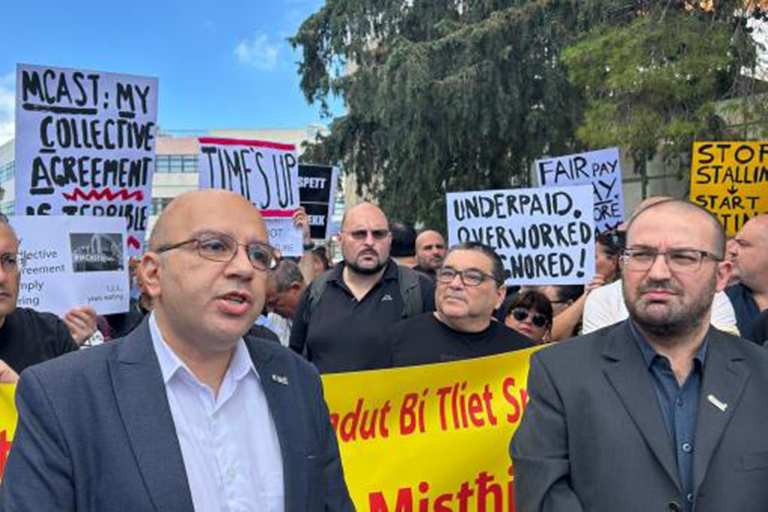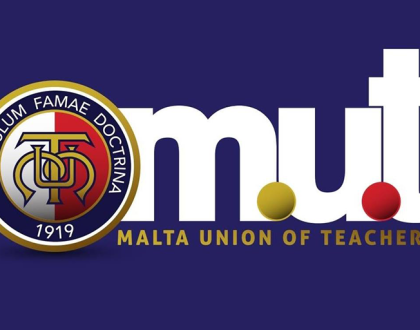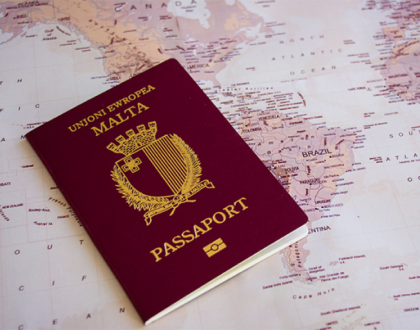MUT Advocates for MCAST Lecturers’ Rights

In a recent demonstration, lecturers from the Malta College for Arts, Science, and Technology (MCAST) convened outside the college's central building in Paola to express their concerns. This demonstration comes as negotiations surrounding their collective agreement have faced prolonged delays. The Malta Union of Teachers (MUT), which represents the lecturers, organized the protest, emphasizing the need for MCAST to reassess its stance regarding the union's demands. As tensions rise, the MUT is preparing to announce further industrial action directives later in the day.
Background of the Dispute
The ongoing dispute dates back nearly three years, with the MUT having engaged in negotiations for a new collective agreement since January 2021. This agreement encompasses various roles within the institution, including but not limited to lecturing positions, student support services, student mentors, directors, deputy directors, technicians, learning support educators, and senior research officers. The collective agreement is crucial in defining the working conditions, pay scales, and overall job security for these professionals.
The union has expressed significant concerns regarding the deterioration of negotiations with MCAST, leading to the declaration of a fresh trade dispute. The lecturers believe that their working conditions and remuneration must reflect the growing demands and responsibilities of their roles, especially in the wake of changing educational landscapes and increasing student enrollment at MCAST.
The Function of the Malta Union of Teachers
The Malta Union of Teachers has been at the forefront of advocating for educators' rights in Malta. Representing a broad spectrum of educational professionals, the MUT plays a critical role in ensuring fair treatment, adequate compensation, and improved working conditions. The current protest highlights the union's commitment to these principles, as well as its willingness to take a stand against what it perceives as unjust practices by MCAST.
The union's leadership has consistently communicated the importance of reaching a fair and equitable agreement with MCAST. They have urged the college's administration to engage in meaningful dialogue and demonstrate a willingness to negotiate in good faith. The current protest is a manifestation of the growing frustration among lecturers, who feel their concerns are not being adequately addressed.
Factors Contributing to the Prolonged Negotiations
Multiple elements have played a role in hindering the timely completion of the collective agreement between the Malta Union of Teachers (MUT) and the Malta College for Arts, Science, and Technology (MCAST). Firstly, the increasing complexity of the educational environment necessitates a comprehensive understanding of the evolving roles and responsibilities of lecturers and support staff. As MCAST continues to expand its offerings and adapt to new educational trends, it is essential that the collective agreement accurately reflects these changes.
Moreover, the financial constraints faced by MCAST have also played a significant role in the protracted negotiations. Budgetary limitations and competing priorities within the institution have complicated discussions, leading to disagreements over salary increases, benefits, and other key provisions of the agreement. The union argues that adequate investment in educators is critical to maintaining the quality of education and ensuring the success of MCAST's programs.
The Impact on Lecturers and Students
The ongoing dispute and the resulting protests have profound implications for both lecturers and students at MCAST. For educators, the lack of a finalized collective agreement leaves them in a state of uncertainty regarding their job security, salaries, and working conditions. Many lecturers express concerns that prolonged negotiations could negatively impact their ability to deliver quality education, as they grapple with feelings of frustration and demotivation.
Students, too, are affected by the dispute. A motivated and well-supported teaching staff is essential for fostering an effective learning environment. As lecturers navigate the stress of ongoing negotiations, students may experience disruptions in their educational experience, including potential delays in course offerings and reduced access to support services.
Future Directions and Potential Outcomes
As the MUT prepares to announce additional directives for industrial action, the future of negotiations between the union and MCAST remains uncertain. The prospect of strikes or other forms of industrial action could escalate tensions further, prompting the college's administration to reconsider its position on the collective agreement.
In the coming weeks, both parties must prioritize open communication and collaboration. MCAST needs to demonstrate a commitment to addressing the union's concerns while ensuring that the needs of students are not compromised. The MUT, on its part, must continue to advocate for educators’ rights while remaining open to constructive dialogue.
The Role of Public Support
Public support for the lecturers' cause is crucial as they navigate this challenging period. Community awareness and advocacy can play a pivotal role in pressuring MCAST to take the necessary steps toward reaching a fair agreement. The MUT encourages stakeholders—students, parents, and the broader public—to stand in solidarity with educators, highlighting the importance of a well-supported teaching workforce in maintaining high educational standards.
Social media campaigns, public forums, and community outreach can all contribute to amplifying the lecturers' voices and raising awareness about the challenges they face. The more public attention is focused on the negotiations, the more likely MCAST will feel compelled to act.
Conclusion
The ongoing protest by MCAST lecturers, led by the Malta Union of Teachers, underscores the urgent need for resolution in the protracted negotiations surrounding their collective agreement. As frustrations mount and uncertainty looms, both the union and MCAST must work collaboratively to address the concerns of educators and ensure a positive educational environment for students. The path forward requires a commitment to dialogue, understanding, and compromise, ultimately benefiting all stakeholders involved in Malta's higher education landscape.
FAQs
What is the current status of the collective agreement negotiations at MCAST?
Negotiations have been ongoing for nearly three years, with significant delays and a fresh trade dispute declared by the Malta Union of Teachers.
What prompted the protest by MCAST lecturers?
Lecturers protested due to dissatisfaction with the progress of negotiations on their collective agreement, calling for MCAST to review its position on union demands.
What roles are included in the collective agreement negotiations?
The collective agreement encompasses lecturing grades, student support services, mentors, directors, technicians, and other educational roles at MCAST.
How long have the lecturers been in negotiations for the collective agreement?
Lecturers have been negotiating for a new collective agreement for two years and nine months.
What actions will the Malta Union of Teachers take next?
The union plans to issue a fresh set of industrial action directives in response to the ongoing negotiations.
How has the deterioration of negotiations affected lecturers?
The deterioration has led to increased frustration and uncertainty regarding job security, pay, and working conditions for lecturers.
What impact does the ongoing dispute have on students?
Students may experience disruptions in their educational experience, including potential delays in course offerings and reduced access to support services.
What factors contribute to the prolonged negotiations?
Budget constraints and the complexity of evolving educational roles have contributed to the delays in finalizing the collective agreement.
How can the public support MCAST lecturers in their cause?
Public support can be demonstrated through awareness campaigns, community outreach, and solidarity actions, emphasizing the importance of a well-supported teaching workforce.
What is the role of the Malta Union of Teachers in this situation?
The Malta Union of Teachers advocates for educators’ rights, ensuring fair treatment and improved working conditions, and represents their interests in negotiations with MCAST.
Recommended Posts

MUT’s Stand on World Teachers’ Day
October 5, 2024

Legal Win for Malta’s Citizenship Program
October 4, 2024

Why iGaming Brands Choose Malta
October 4, 2024




